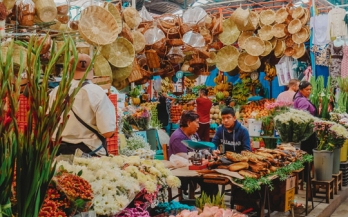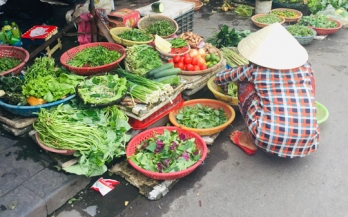Consumption of sugar-sweetened beverages (SSBs) is rising rapidly, especially in urban areas in low- and middle-income countries (LMICs). SSB consumption increases the risk for overweight and obesity, which are linked to a variety of non-communicable diseases (NCDs), including diabetes, cardiovascular diseases and certain types of cancer. One policy tool targeted at lessening the consumption of SSBs is a SSB tax, which increases the price of sugary drinks in a given area, which could be a single city, states or a country.
Public food procurement refers to how governments purchase and provide food to defined populations. Institutional food procurement refers to food purchasing and provision by organisations like schools, hospitals, care homes, youth clubs, prisons, and workplaces. Local governments often manage public food procurement at these institutions, serving food to students, patients, employees, and their families.
The number of people living in urban environments is growing at a rapid rate. Urban living fundamentally changes how people eat, as they are more reliant on needing paid employment and are more limited with growing their own food. This shift towards more urban living is also seeing big changes in food environments for most people, and what food is available, affordable and accessible to them.
Food systems are essential to food and nutrition security. They are also major drivers of economic, environmental, and social development and can be positive forces for urban development. This is critical, as increasing urbanisation of the global population is shifting the relative burden of poverty, food insecurity, and malnutrition to cities. To keep up with this growth, greater urban infrastructure, are required.
In 2016, Tanzania put in place a nutrition action plan that would seek to go beyond previous action plans and strategies. The Prime Minister’s Office took the lead in developing a nutrition action plan that not only had ambitious goals and targets but also explicitly called on other sectors to join the country’s fight against malnutrition.
Street foods - ready-to-eat foods or beverages that are sold by vendors in the street or other public places - play an important role in contributing to daily nutrition and ensuring food security worldwide. India has a rich tradition of street food vending, much of it taking place in urban areas and accessed by people from all socio-economic backgrounds.
Foodborne illnesses contribute to the burden of diseases worldwide. Ensuring food safety is therefore essential to fight malnutrition in all its forms. In Pakistan, the Punjab Food Authority (PFA) was established in 2011 with the responsibility for ensuring the safety and quality of all food items and products in the province through raising awareness and enforcing food hygiene and quality standards.
These document series summarise some rapid assessments undertaken by the Global Alliance for Improved Nutrition (GAIN) to understand early impacts of the COVID-19 coronavirus pandemic on food systems in a set of low- and middle-income countries where GAIN works (Bangladesh, India, Pakistan, Indonesia, Mozambique, Ethiopia, Kenya, Tanzania, Rwanda, and Nigeria).
These document series summarise some rapid assessments undertaken by the Global Alliance for Improved Nutrition (GAIN) to understand early impacts of the COVID-19 coronavirus pandemic on food systems in a set of low- and middle-income countries where GAIN works (Bangladesh, India, Pakistan, Indonesia, Mozambique, Ethiopia, Kenya, Tanzania, Rwanda, and Nigeria).
These document series summarise some rapid assessments undertaken by the Global Alliance for Improved Nutrition (GAIN) to understand early impacts of the COVID-19 coronavirus pandemic on food systems in a set of low- and middle-income countries where GAIN works (Bangladesh, India, Pakistan, Indonesia, Mozambique, Ethiopia, Kenya, Tanzania, Rwanda, and Nigeria).










